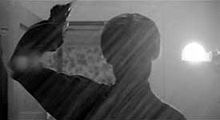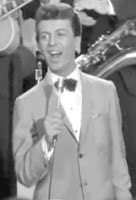Alfred Hitchcock's Psycho, is probably the director's most famous film. It's now hailed as one of his best, however, critics weren't very thrilled with Hitchcock's venture into the horror genre when the film was released in June 1960. Whether Psycho qualifies as a "horror" film is open to debate, but the film's macabre elements and the violent way in which those elements were presented was regarded as a step down for Hitchcock who, in previous films, relied on subtlety and suggestion to convey the more unpleasant aspects of the script. While the famous "shower scene" is mild by today's standards, in 1960 the amount of blood spilled was considered gratuitous.
I first saw Psycho when I was an usher at the old Centre Theatre in Chatham, Ontario when the film returned to the theatres for it's second run. I was working the balcony that night and when the notorious shower scene arrived, our devious projectionist had a habit of cranking up the sound volume to enhance the horror of those few minutes. Even though my fellow ushers had warned me this was coming, I still wasn't prepared for those screeching violins and cellos and almost jumped out of my shoes along with the audience. I would go on to see that scene about a dozen times during its run and it creeped me out every time.
An important element of Psycho is the superb black and white cinematography of John L. Russell, the same cinematographer who handled the camera work on Hitchcock's television anthology program. Brooding shadows are expertly captured by Russell's lens, and his work was deservedly nominated for an Oscar. The scenes in which Norman Bates (Anthony Perkins) dispenses death to his victims are strikingly photographed and Russell's talents are also represented well in less heralded scenes.
These include the scenes in which Marion Crane (Janet Leigh) drives along the road at night while the voices of her co-workers, as well as her victim, are heard questioning her whereabouts and wondering what fate has befallen both Crane and the money she was responsible for depositing. Perhaps the film's eeriest moment, especially for those who have seen the film, is when Crane reaches what will be her final destination on a dark, rain splattered night. The wipers clear the rain from the windshield of her car, and suddenly the neon sign bearing the Bates Motel — vacancy — becomes visible.
While the look of the film is important, there should be equal appreciation for its sound, particularly the music score by Bernard Herrmann. From the opening moments when the titles (expertly designed by Saul Bass) are slashed away, the composer masterfully conveys the sense of a knife eagerly ripping into human flesh. The Psycho score is music perfect for carving meat, and the film would be much less effective without it.
Hitchcock's touches of black humor are very evident in Psycho, most notably in Norman's hobby — taxidermy. Norman Bates likes to stuff things. The stuffed birds that adorn the walls of Norman's office were prophetic, for Hitchcock would, in his next film, provide members of the flying set an opportunity to stuff themselves by snacking on human heads in 1963's The Birds. In Psycho, those ever watchful yet dead eyes seem to represent Norman's voyeurism, his only mode of sexual expression, not only before the murder of Marion Crane when he watches her undress through a peephole, but throughout the film. When not cutting loose with a kitchen knife, Norman is passive, watching, and seemingly preparing for the kill.
The film stumbles somewhat at the end, but not as badly as Mrs. Bates whose hollow-eyed corpse hogs a well deserved close-up at the film's climax, but enough to prevent Psycho from achieving perfection. A lengthy denouement in which a psychologist (Simon Oakland) attempts to explain the motives behind Norman's behavior is filled with a lot of sophomoric psychology that would be embarrassing if it wasn't so dull. Rigormortis sets in at this point, and the scene seems longer than the 108 minute running time of the entire picture. Fortunately, there is a payoff in the final moments when Norman Bates returns to the screen for a brief but shocking moment as both mother and son.
Psycho is an important film, not only in Hitchcock's filmography, but also in film history and culture. For Hitchcock, Psycho is unique and a source of controversy. After a string of big budget, colorful, and glamorous films (To Catch a Thief, North by Northwest), Hitchcock was forced into making Psycho on a very small budget, filming almost entirely on the backlot of Universal Studios. (At one point, it is even rumored that the film, having shocked the original distributor, Paramount, almost became a two-part episode of his NBC program, Alfred Hitchcock Presents.)
Psycho's ultimate success reverberated throughout Hollywood. The film's graphic, for the time, depictions of violence broke a few taboos, and after John Carpenter's 1978 production of Halloween, which owed a debt to Hitchcock's style, Psycho was deemed to be the first "slasher" film. Soon after the Friday the 13th series followed in the wake of Halloween's box office success.
A great companion film to Psycho is the 2012 film Hitchcock, which depicts the development and filming of Psycho and all the trials and tribulations that ensued. Anthony Hopkins and Helen Mirren are spot on as Hitch and his wife Alma Reville and they're quite a couple. The script is smart and witty and is a great way to understand how difficult it was to get this picture made.

Psycho (1960)
Anthony Perkins ... Norman Bates
Vera Miles ... Lila Crane
John Gavin ... Sam Loomis
Janet Leigh ... Marion Crane
Martin Balsam ... Det. Milton Arbogast
Director ... Alfred Hitchcock
Psycho Trailer:
I first saw Psycho when I was an usher at the old Centre Theatre in Chatham, Ontario when the film returned to the theatres for it's second run. I was working the balcony that night and when the notorious shower scene arrived, our devious projectionist had a habit of cranking up the sound volume to enhance the horror of those few minutes. Even though my fellow ushers had warned me this was coming, I still wasn't prepared for those screeching violins and cellos and almost jumped out of my shoes along with the audience. I would go on to see that scene about a dozen times during its run and it creeped me out every time.
An important element of Psycho is the superb black and white cinematography of John L. Russell, the same cinematographer who handled the camera work on Hitchcock's television anthology program. Brooding shadows are expertly captured by Russell's lens, and his work was deservedly nominated for an Oscar. The scenes in which Norman Bates (Anthony Perkins) dispenses death to his victims are strikingly photographed and Russell's talents are also represented well in less heralded scenes.
These include the scenes in which Marion Crane (Janet Leigh) drives along the road at night while the voices of her co-workers, as well as her victim, are heard questioning her whereabouts and wondering what fate has befallen both Crane and the money she was responsible for depositing. Perhaps the film's eeriest moment, especially for those who have seen the film, is when Crane reaches what will be her final destination on a dark, rain splattered night. The wipers clear the rain from the windshield of her car, and suddenly the neon sign bearing the Bates Motel — vacancy — becomes visible.
While the look of the film is important, there should be equal appreciation for its sound, particularly the music score by Bernard Herrmann. From the opening moments when the titles (expertly designed by Saul Bass) are slashed away, the composer masterfully conveys the sense of a knife eagerly ripping into human flesh. The Psycho score is music perfect for carving meat, and the film would be much less effective without it.
Hitchcock's touches of black humor are very evident in Psycho, most notably in Norman's hobby — taxidermy. Norman Bates likes to stuff things. The stuffed birds that adorn the walls of Norman's office were prophetic, for Hitchcock would, in his next film, provide members of the flying set an opportunity to stuff themselves by snacking on human heads in 1963's The Birds. In Psycho, those ever watchful yet dead eyes seem to represent Norman's voyeurism, his only mode of sexual expression, not only before the murder of Marion Crane when he watches her undress through a peephole, but throughout the film. When not cutting loose with a kitchen knife, Norman is passive, watching, and seemingly preparing for the kill.
The film stumbles somewhat at the end, but not as badly as Mrs. Bates whose hollow-eyed corpse hogs a well deserved close-up at the film's climax, but enough to prevent Psycho from achieving perfection. A lengthy denouement in which a psychologist (Simon Oakland) attempts to explain the motives behind Norman's behavior is filled with a lot of sophomoric psychology that would be embarrassing if it wasn't so dull. Rigormortis sets in at this point, and the scene seems longer than the 108 minute running time of the entire picture. Fortunately, there is a payoff in the final moments when Norman Bates returns to the screen for a brief but shocking moment as both mother and son.
Psycho is an important film, not only in Hitchcock's filmography, but also in film history and culture. For Hitchcock, Psycho is unique and a source of controversy. After a string of big budget, colorful, and glamorous films (To Catch a Thief, North by Northwest), Hitchcock was forced into making Psycho on a very small budget, filming almost entirely on the backlot of Universal Studios. (At one point, it is even rumored that the film, having shocked the original distributor, Paramount, almost became a two-part episode of his NBC program, Alfred Hitchcock Presents.)
Psycho's ultimate success reverberated throughout Hollywood. The film's graphic, for the time, depictions of violence broke a few taboos, and after John Carpenter's 1978 production of Halloween, which owed a debt to Hitchcock's style, Psycho was deemed to be the first "slasher" film. Soon after the Friday the 13th series followed in the wake of Halloween's box office success.
A great companion film to Psycho is the 2012 film Hitchcock, which depicts the development and filming of Psycho and all the trials and tribulations that ensued. Anthony Hopkins and Helen Mirren are spot on as Hitch and his wife Alma Reville and they're quite a couple. The script is smart and witty and is a great way to understand how difficult it was to get this picture made.

Psycho (1960)
Anthony Perkins ... Norman Bates
Vera Miles ... Lila Crane
John Gavin ... Sam Loomis
Janet Leigh ... Marion Crane
Martin Balsam ... Det. Milton Arbogast
Director ... Alfred Hitchcock
Psycho Trailer:











































